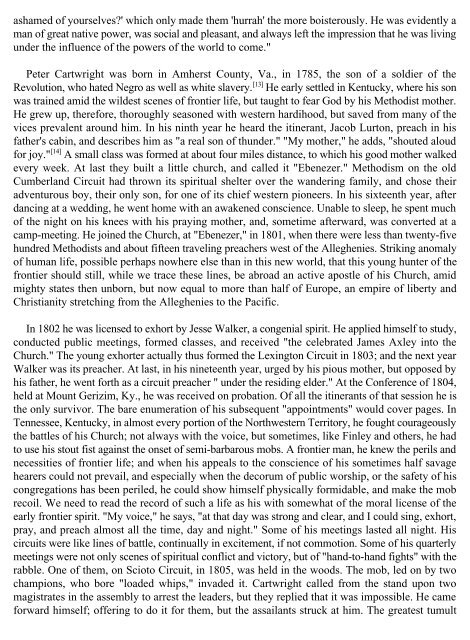History of the M.E. Church, Vol. IV - Media Sabda Org
History of the M.E. Church, Vol. IV - Media Sabda Org
History of the M.E. Church, Vol. IV - Media Sabda Org
Create successful ePaper yourself
Turn your PDF publications into a flip-book with our unique Google optimized e-Paper software.
ashamed <strong>of</strong> yourselves?' which only made <strong>the</strong>m 'hurrah' <strong>the</strong> more boisterously. He was evidently a<br />
man <strong>of</strong> great native power, was social and pleasant, and always left <strong>the</strong> impression that he was living<br />
under <strong>the</strong> influence <strong>of</strong> <strong>the</strong> powers <strong>of</strong> <strong>the</strong> world to come."<br />
Peter Cartwright was born in Amherst County, Va., in 1785, <strong>the</strong> son <strong>of</strong> a soldier <strong>of</strong> <strong>the</strong><br />
[13]<br />
Revolution, who hated Negro as well as white slavery. He early settled in Kentucky, where his son<br />
was trained amid <strong>the</strong> wildest scenes <strong>of</strong> frontier life, but taught to fear God by his Methodist mo<strong>the</strong>r.<br />
He grew up, <strong>the</strong>refore, thoroughly seasoned with western hardihood, but saved from many <strong>of</strong> <strong>the</strong><br />
vices prevalent around him. In his ninth year he heard <strong>the</strong> itinerant, Jacob Lurton, preach in his<br />
fa<strong>the</strong>r's cabin, and describes him as "a real son <strong>of</strong> thunder." "My mo<strong>the</strong>r," he adds, "shouted aloud<br />
[14]<br />
for joy." A small class was formed at about four miles distance, to which his good mo<strong>the</strong>r walked<br />
every week. At last <strong>the</strong>y built a little church, and called it "Ebenezer." Methodism on <strong>the</strong> old<br />
Cumberland Circuit had thrown its spiritual shelter over <strong>the</strong> wandering family, and chose <strong>the</strong>ir<br />
adventurous boy, <strong>the</strong>ir only son, for one <strong>of</strong> its chief western pioneers. In his sixteenth year, after<br />
dancing at a wedding, he went home with an awakened conscience. Unable to sleep, he spent much<br />
<strong>of</strong> <strong>the</strong> night on his knees with his praying mo<strong>the</strong>r, and, sometime afterward, was converted at a<br />
camp-meeting. He joined <strong>the</strong> <strong>Church</strong>, at "Ebenezer," in 1801, when <strong>the</strong>re were less than twenty-five<br />
hundred Methodists and about fifteen traveling preachers west <strong>of</strong> <strong>the</strong> Alleghenies. Striking anomaly<br />
<strong>of</strong> human life, possible perhaps nowhere else than in this new world, that this young hunter <strong>of</strong> <strong>the</strong><br />
frontier should still, while we trace <strong>the</strong>se lines, be abroad an active apostle <strong>of</strong> his <strong>Church</strong>, amid<br />
mighty states <strong>the</strong>n unborn, but now equal to more than half <strong>of</strong> Europe, an empire <strong>of</strong> liberty and<br />
Christianity stretching from <strong>the</strong> Alleghenies to <strong>the</strong> Pacific.<br />
In 1802 he was licensed to exhort by Jesse Walker, a congenial spirit. He applied himself to study,<br />
conducted public meetings, formed classes, and received "<strong>the</strong> celebrated James Axley into <strong>the</strong><br />
<strong>Church</strong>." The young exhorter actually thus formed <strong>the</strong> Lexington Circuit in 1803; and <strong>the</strong> next year<br />
Walker was its preacher. At last, in his nineteenth year, urged by his pious mo<strong>the</strong>r, but opposed by<br />
his fa<strong>the</strong>r, he went forth as a circuit preacher " under <strong>the</strong> residing elder." At <strong>the</strong> Conference <strong>of</strong> 1804,<br />
held at Mount Gerizim, Ky., he was received on probation. Of all <strong>the</strong> itinerants <strong>of</strong> that session he is<br />
<strong>the</strong> only survivor. The bare enumeration <strong>of</strong> his subsequent "appointments" would cover pages. In<br />
Tennessee, Kentucky, in almost every portion <strong>of</strong> <strong>the</strong> Northwestern Territory, he fought courageously<br />
<strong>the</strong> battles <strong>of</strong> his <strong>Church</strong>; not always with <strong>the</strong> voice, but sometimes, like Finley and o<strong>the</strong>rs, he had<br />
to use his stout fist against <strong>the</strong> onset <strong>of</strong> semi-barbarous mobs. A frontier man, he knew <strong>the</strong> perils and<br />
necessities <strong>of</strong> frontier life; and when his appeals to <strong>the</strong> conscience <strong>of</strong> his sometimes half savage<br />
hearers could not prevail, and especially when <strong>the</strong> decorum <strong>of</strong> public worship, or <strong>the</strong> safety <strong>of</strong> his<br />
congregations has been periled, he could show himself physically formidable, and make <strong>the</strong> mob<br />
recoil. We need to read <strong>the</strong> record <strong>of</strong> such a life as his with somewhat <strong>of</strong> <strong>the</strong> moral license <strong>of</strong> <strong>the</strong><br />
early frontier spirit. "My voice," he says, "at that day was strong and clear, and I could sing, exhort,<br />
pray, and preach almost all <strong>the</strong> time, day and night." Some <strong>of</strong> his meetings lasted all night. His<br />
circuits were like lines <strong>of</strong> battle, continually in excitement, if not commotion. Some <strong>of</strong> his quarterly<br />
meetings were not only scenes <strong>of</strong> spiritual conflict and victory, but <strong>of</strong> "hand-to-hand fights" with <strong>the</strong><br />
rabble. One <strong>of</strong> <strong>the</strong>m, on Scioto Circuit, in 1805, was held in <strong>the</strong> woods. The mob, led on by two<br />
champions, who bore "loaded whips," invaded it. Cartwright called from <strong>the</strong> stand upon two<br />
magistrates in <strong>the</strong> assembly to arrest <strong>the</strong> leaders, but <strong>the</strong>y replied that it was impossible. He came<br />
forward himself; <strong>of</strong>fering to do it for <strong>the</strong>m, but <strong>the</strong> assailants struck at him. The greatest tumult
















